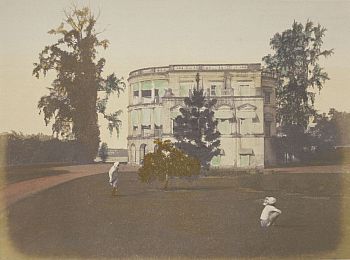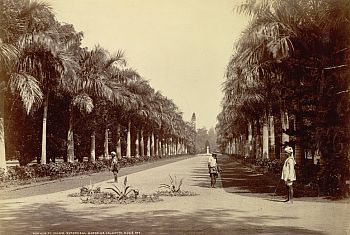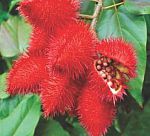The Centre for World Environmental History at the University of Sussex, in collaboration with the British Library, the Library and Archives of the Royal Botanic Gardens, Kew, The Library and archives of the Natural History Museum, the U.K. Met office is developing a major research project on the records of natural history and in particular on the records of imperial botany and meteorology .
The project
This project which forms part of the Global Transformations research theme at the university responds to recent initiatives by the AHRC, particularly the support for research into South Asian Records of Climate Change.
The heart of the Centre’s current projects are two related projects, one project focuses on “Kew and India”. The project addresses a series of questions on the specific contribution of Kew in shaping the categories of natural knowledge and the capacity of communities to know and engage with the environment from the eighteenth to the twentieth centuries. The second project aims at mapping the historic climate archive for the Indian Ocean World and to model particular climate events over a the last 500 years and even longer over a 2000 year period. Part of the larger project will compile a database of the paleoclimatic proxy archives (preferably continuous) that offer quantitative reconstructions of key climatic parameters for the Indian Ocean basin. Datasets will be filtered according to an agreed set of criteria that will likely include chronological control and errors, resolution of the time series, and geographical location of the archive. This is in collaboration with the Indian Ocean World Centre in Mcgill University in Canada.
The research agenda is inspired by the work of Richard Grove. Grove’s hypothesis was that the information-gathering institutions of modern forms of empire captured and made visible global patterns of environmental and climate change. He also argued that the politics of empire had significant environmental consequences. Empires not only recorded the data of natural history, the institutions of empire shaped the natural world. The goal of our research will be to sponsor research that analyses and explains this interaction of human societies with their environments.
The archive of imperial natural history is extraordinarily diverse. It ranges from landscape features, including remains of imperial institutions, through collections of natural objects, such as herbaria, and immense quantities of paper records. The archive offers a treasure trove of observations, such as climate and weather data, that are of immediate use to a variety of disciplines. This aspect of the archive opens up exciting avenues for collaborative work for historians. It is an immensely intellectually challenging archive however. To use it properly historians must be aware of the conditions of its production. The cross-cultural nature of so much of the archive demands particular attention. It is also a technically challenging archive. The techniques through which the objects in economic botany collections, land-use patterns and correspondence networks can be made to speak to one another are only slowly emerging. As well as developing techniques of analysis scholars have to address the need to make these kinds of records as publically accessible as possible. This is a particularly important feature of a project that is international by its very nature.
The Centre has held several workshops in U.K. and India to discuss the problems and possibilities of this research from May 2011-May 2014.
Researchers on this related project include; Vinita Damodaran, Jim Endersby, Anna Winterbottom, James Hamilton, George Adamson, David Nash, Dominic Kniveton and Mick Frogley
School Project on the Botanical and Meteorological History of The Indian Ocean
Other Exhibitions
- A Woman Scientist: the Life of E.K. Janaki Ammal 1897-1984 [PDF 742.50KB]
- Joseph Dalton Hooker: Botanical Trailblazer and the Botanical Heritage of India [PDF 759.87KB]
- Brochure: Two exhibitions
- Natural History Heritage of India - Conference Programme Kolkata 1-2 Oct [PDF 434.04KB]
- Natural History Heritage of India - Conference Programme Mysore 6-7 Oct [PDF 88.61KB]
- Report on the Inaugural Conferences of the Natural History Heritage Exhibitions [PDF 1.33MB]
- AHRC Indian Exhibition Project - UK Visit of Dr Anindita Saha to Kew, BL and Sussex 3-13 November 2016

Roxburgh House
Proposed Restoration of the William Roxburgh House
[PDF 236.04KB]
CWEH leaflet featuring Roxburgh House [PDF 2.24MB]
Right: Roxburgh House c 1850
 Collaborators
Collaborators
- Met office
- Royal Botanical Gardens, Kew (RBG Kew), London
- The British Library (BL), London
- The Natural History Museum (NHM), London
- Royal Botanic Gardens, Edinburgh
- Acharya Jagdish Chandra Bose Gardens, Kolkata
- Indian Museum
- National Archives of India
Botany in British India - project outcomes [PDF 120.22KB]
Workshops
- 5-6 December 2012, University of Sussex
- 30-31 August 2013, JNU, New Delhi
- 21-24 April 2014, World Meteorological Organisation - International Workshop on the Recovery of Climate Heritage in the Indian Ocean rim Countries and Islands [PDF 352.92KB]
- 14 May 2014, University of Sussex - programme and transcript
List of members
Botanical and Meteorological History of The Indian Ocean World - list of members [PDF 260.69KB]
Meetings
Including minutes from the Steering and Technical committees
- Ghent meeting October 2018 facilitated by the Canadian social science research council on Human Nature interaction in the Indian Ocean World
- Minutes of AHRC Project Meeting on Collaborations with BSI - 3rd July 2017 [PDF 52.95KB]
- Minutes of BSI, Kew and CWEH Meeting on Future Collaborations - 30th June 2017 [PDF 48.14KB]
- Minutes of AHRC Project Meeting of the Project’s Steering Committee 22 September 2016 [PDF 122.71KB]
- Minutes of AHRC Project Meeting between the Centre for World Environmental History, the British Library and Kew Gardens 3 August 2016 [PDF 91.78KB]
- Minutes of meeting to discuss the potential for collaborations between the Centre for World and Environmental History and Kew Gardens 16-01-15 [PDF 18.30KB]
- Minutes of meeting to discuss the progress of the McGill Climate Project work package 5 12-12-2014 [PDF 9.50KB]
- Minutes of meeting to discuss the status and progress of the McGill University, Indian Ocean World Centre, climate history project 12-12-14 [PDF 46.98KB]
- Summary of a meeting between members of CWEH and the Wildlife of India Institute (WII) 01-09-13 [PDF 103.03KB]
- Notes of Climate History Discussion Group, Jawaharlal Nehru University, 31-08-13 [PDF 256.89KB]
- Minutes of meeting between the British Library (BL), University of Sussex and Jawaharlal Nehru University (JNU) 04-02-13 [PDF 114.64KB]
- Report on Botany in British India study day 07-12-12 [PDF 226.45KB]
- Minutes of Network Steering Committee meeting 21-03-14 [PDF 153.42KB]
- Minutes of Network Steering Committee meeting 16-01-14 [PDF 92.59KB]
- Minutes of Technical Committee meeting 05-11-13 [PDF 21.56KB]
- Minutes of Technical Committee meeting 08-05-13 [PDF 278.28KB]
- Minutes of Technical Committee meeting 09-10-12 [PDF 224.03KB]
- Minutes of Technical Committee meeting 29-06-12 [PDF 197.68KB]
Archive surveys and reports
- Report on the Environmental Education Awareness Programme (EEAP) 2018-19 [PDF 192.28KB]
- Archive surveys [PDF 520.75KB]
- Brief report on libraries, archives and museums in Dehra Dun, September 2013 [PDF 85.46KB]
- Jesuit archives: JNU Seminar [PDF 29.25KB]
- Malaysia and Singapore archives [PDF 481.21KB]
- Meteorological database Malaya [XLS 59.50KB]
Blogs
History and science meet - from the Untold Lives Blog
Members' publications
Publications: Botanical and Meteorological History of The Indian Ocean World



